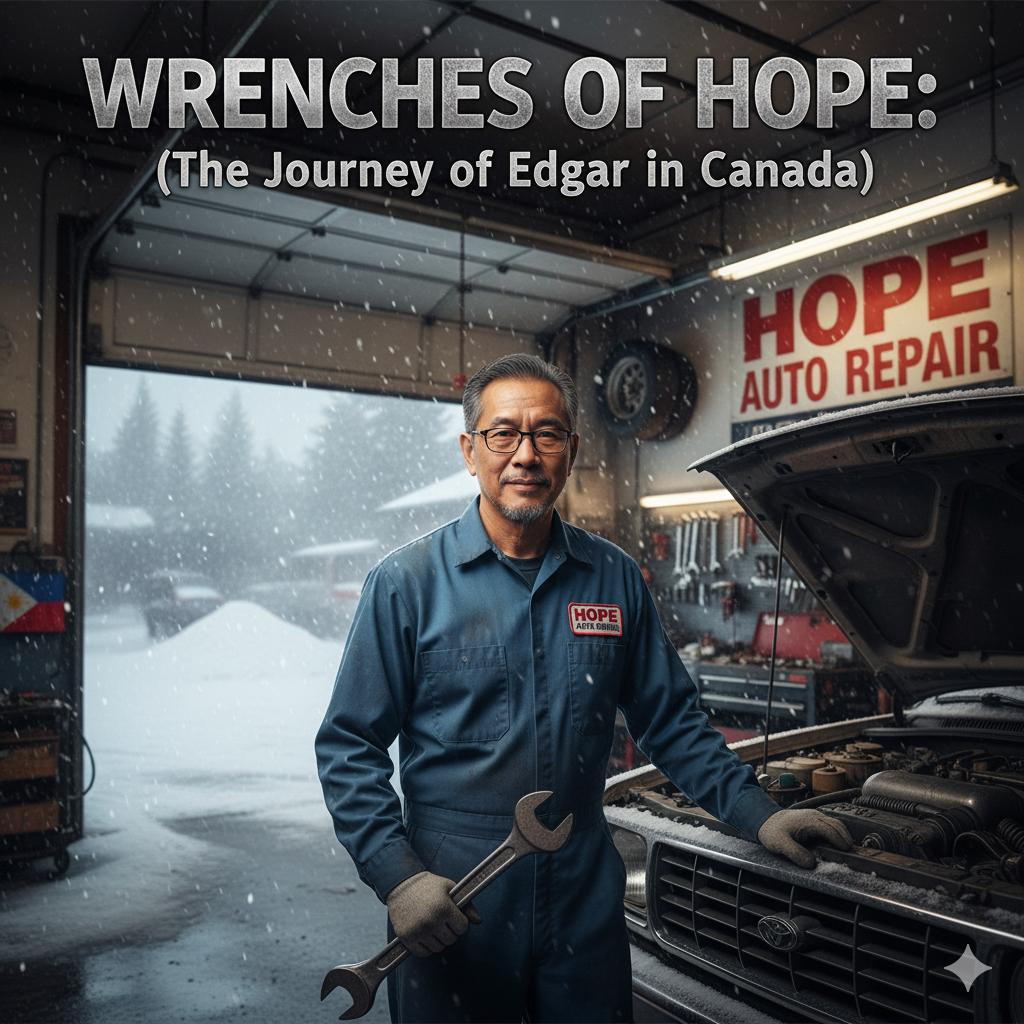Cold air stung Mang Edgar’s cheeks the moment he stepped out of the Toronto airport. A gust of wind blew against his jacket, a reminder that he was thousands of miles away from the humid mornings of Cavite where his wife, Liza, and two children Ella and Junjun were probably still asleep.
At 47, becoming an OFW felt like starting life all over again. Yet he was determined. “Para sa pamilya,” he whispered, gripping the handle of his worn-out tool bag as if it were a lifeline. Those tools had helped him survive many years as a jeepney mechanic back home. Now, they symbolized hope.
His first few weeks in Canada were overwhelming. The repair shop in Mississauga where he was hired NorthPoint Auto Solutions was far bigger and more advanced than the small talyer he used to run. Diagnostic computers, hydraulic lifts, torque wrenches with digital gauges everything seemed too sophisticated.
“Don’t worry, Edgar,” his supervisor, Mike, said on his first day. “You’ll get the hang of it. Skills can be upgraded. Diligence? That’s harder to teach and you already have that.”
Those words boosted his spirit. Still, adjusting wasn’t easy. He struggled with the pace of work, the freezing mornings, and the constant fear of making mistakes. There were times, after a long day, he would sit alone in his small rented room, staring at the snow outside the window, wondering if he made the right decision.
But every video call with his family erased his doubts.
“Papa, I got highest score in Math!” Ella bragged one night.
“Pa, tingnan mo oh, may bagi akong drawing!” Junjun said, showing his scribbles to the camera.
Liza, always smiling despite the distance, told him, “Kaya mo ‘yan. Nandito kami,”
Those moments gave him strength.
One winter morning, a customer brought in a delivery van with severe engine trouble. It was rush season, and the van was needed for shipping. The repair was complicated, involving electrical issues and a failing alternator.
“Can you handle this, Edgar?” Mike asked.
He hesitated. The system was different from what he was used to. But he remembered how back home, even with limited tools, he fixed jeepneys that others had already given up on.
“Sige, boss,” he answered. “I’ll do my best.”
He spent hours diagnosing the problem, tracing wires, rechecking codes, and comparing results with the computer. His hands grew numb from the cold each time he stepped out to test the engine, but he kept going. By late afternoon, the van roared back to life.
The warehouse manager, grateful and surprised, shook his hands. “Your mechanic is amazing,” he told Mike.
It was the first time since arriving in Canada that Mang Edgar felt genuinely proud. That night, he celebrated with instant noodles but a full heart.
Months passed, and he slowly built a reputation. Customers began asking for him specifically.
“That Filipino guy he’s quick, and he explains well,” one customer commented. “His work lasts longer than the others,” said another.
His co-workers admired his work ethic. Even when everyone went home, Edgar stayed behind to study new car models, watch online tutorials, and practice on old engines the shop no longer used.
Mike noticed his dedication. One Friday afternoon, he called him into the office.
“You’ve improved a lot,” he said. We want to promote you to senior mechanic. Higher pay. More responsibilities. You’ve earned it.”
Tears formed in Edgar’s eyes. “Thank you, sir. This means a lot.”
He immediately called his family.
“Ma, may promotion ako,” he said, voice trembling.
Ella squealed. Junjun clapped. Liza smiled, eyes glistening with pride. “Kaya mo kasi. Alam ko ‘yan.”
Despite his success, loneliness remained his greatest battle. Weekends felt heavy. Snowy days made him miss warm Filipino food sinigang on rainy evenings, barbeque on Sundays, puto from the town market.
One December, he received news that his mother had fallen ill. The guilt hit him like a wrench to the chest. Being away from family was the hardest part of being an OFW. He wanted to go home, but the expenses were too high, and his savings were still small.
Liza comforted him. “Naiintindihan ka ni Mama. Huwag kang mag-alala, nandito kami. Magpagaling lang siya.”
Those were painful weeks, but he pused through, sending money home for medicines and check-ups. Eventually, his mother’s condition improved.
“Salamat, anak,” she told him in a video call. “Hindi mo kami pinapabayaan kahit malayo ka.”
He felt a weight lift off his chest.
Two years after arriving in Canada, Mang Edgar had saved enough to bring his family for a short vacation and soon, he hoped, for permanent residency.
He began looking for a better apartment, something spacious enough for four people. He dreamed of driving his kids to school, cooking breakfast on cold mornings, and watching movies together without worrying about poor internet connection.
One Saturday morning, while wiping grease from his hands, Mike approached him again.
“The company wants to sponsor your permanent residency application,” he said. “You’re an asset here, Edgar.”
His knees almost buckled. “Sir… totoo?
“Absolutely.”
He rushed home and immediately video-called his family.
“Pa, ano ‘yan? Ba’t nanginginig ka?” Ella asked.
“We might stay in Canada… together,” he told them.
The family burst into tears happy tears. The kind that come after years of sacrifice.
A year later, at the Toronto airport, Edgar stood waiting not as a lonely new migrant, but as a father ready to welcome his family. When he saw Liza, Ella, and Junjun emerging from the doors, he felt his heart swell.
“Pa!” the kids yelled, running to him.
For the first time in years, he held them in his arms warm, real, no longer through a screen.
“This is our new beginning,” he whispered.
The winter air no longer felt cold. It felt like hope.



